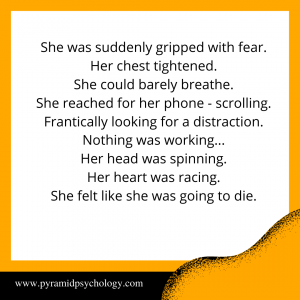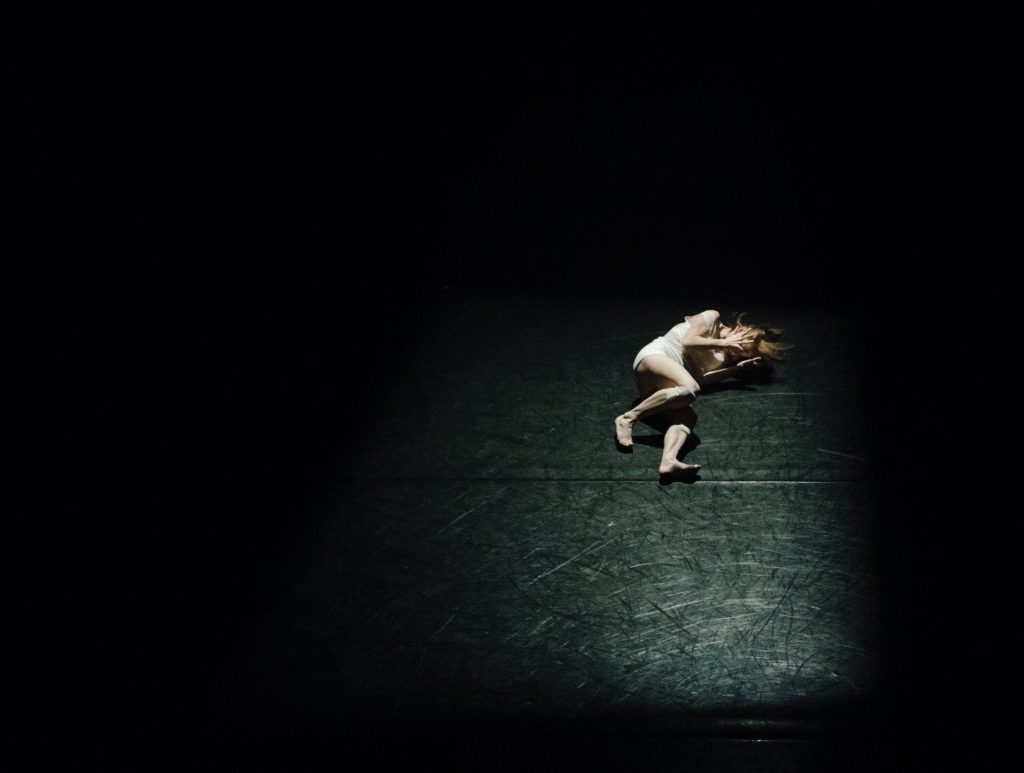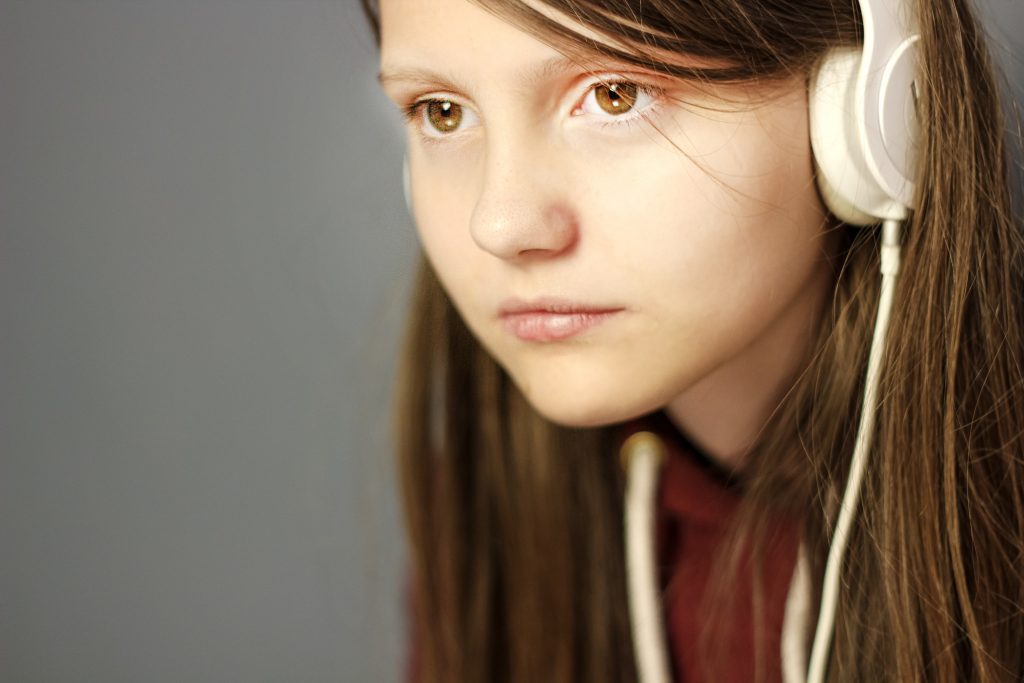Panic Attacks – When Anxiety Makes It Hard to Breathe

Photo by Canva
I had my first panic attack as an adult, not as a teen – and it was a very frightening experience.
My heart was racing. It felt like my throat was closing; like I couldn’t breathe. My thoughts were all over the place. Not knowing what to do created more panic… Thankfully I had a wonderful support person who I was able to reach out to and she calmly stayed with me until it passed. I don’t even remember exactly what she said to me – something simple, in a calm, gentle tone.
Having a panic attack can be terrifying for your teen. They are stress and anxiety responses that spiral into a really intense physical response that can include a racing heart, quick/shallow/rapid breathing, shaking, nausea, racing thoughts, and feelings of doom (thinking they are having a heart attack or even dying).
Generally, panic attacks only last for a few minutes, with some lasting as long as 10 – 15 minutes. However, the intensity of the symptoms for your teen can make it feel like they are much longer – forever.
Panic attacks are hard on your teen emotionally, physically, and psychologically. And well hard on you as a parent, knowing your teen is paralyzed with fear in those moments. Let’s take a look at what causes them, how to work through them, and ways to prevent them.

Photo by Hailey Kean on Unsplash
What causes panic attacks?
There are some potential medical causes for panic attacks – stuff going on with your teen’s thyroid, respiratory disorders, etc. The Mayo Clinic lists some of the potential medical causes HERE. If your teen has experienced more than a couple panic attacks (they are happening regularly) or there is a sudden increase in the frequency, it’s important that they see a medical physician to consider underlying physical conditions .
If there are no medical reasons for your teen’s panic attack(s), the cause is often a response to anxious thoughts and stress. Your teen may have triggering events or circumstances that they find to be extremely stressful – such as crowded areas or school hallways, if social situations increase their anxiety. Triggers could also look like performance anxiety – when an important school test is coming up, or lots of assignments and deadlines, the overall anxiety can cause a panic attack as well. I’ve had teens I work with that respond to family arguments – continuous fighting – with panic attacks.
When panic attacks need further attention.
Some of the teens I work with have anticipatory panic about having another panic attack, which can ramp up into another panic attack. They worry about having a panic attack in a public space or somewhere they don’t feel safe, where they can’t get away or escape.
Others avoid situations and experiences with fear that they will have an anxiety attack – going to school, social situations, things they used to enjoy doing, etc.
If your teen is avoiding these things, or fearing panic attacks in the future, looking into resources and support is definitely something you’ll want to look into. At Pyramid Psychology we offer therapy, as well as a coaching program designed specifically for anxiety. You can take a look at both HERE.
Panic disorders are good to be aware of as well – recognizing when your teen may be struggling beyond a reaction to anxious thoughts. Symptoms and descriptions of some panic orders are listed HERE. Seek support from a medical physician if you feel your teen may have a panic disorder.
How to support your teen during a panic attack.
Supporting your teen during a panic attack can be frightening for you, too.
Here are six strategies that may be helpful for your teen during a panic attack:
- Find a calm, quiet space. Not all teens will want to leave the space where they are, so you check in with your teen on what they would prefer if another panic attack occurs. Generally speaking, a change of environment is a good option. A safe space could be their bedroom, or if they’re at school, a zen room, or quiet spot in the counsellor’s office, etc.
- Tap into the five senses. Ask your teen to notice things around them, using their senses. What can they hear in the room? See? Hear? Etc.
- Breathing techniques. There are a few breathing exercises your teen can do the moment to slow their breathing, and pull their focus from the anxiety such as five finger breathing or box breathing. You can also ask your teen to put one of their hands on their chest and one on their abdomen – breathe in for four seconds if possible, hold, and breathe out for seven (physically slowing their breathing down).
It’s important to note that breathing techniques may be too hard for your teen at the peak of a panic attack. A good rule of thumb is to revert to the five senses exercise above, if breathing is triggering your teen further.
- Imagery. This is a strategy you’ll want to set up before the panic occurs. It is also called a mental vacation. Encourage your teen pick a favourite place, image, or memory that brings them calm and peace. They can imagine what space is like, what they are doing, seeing, hearing, etc. To feel the emotions of that place or memory.
One of my mental vacation pictures is camping. I picture looking at the vast sky full of stars, hearing the fire crackling and smelling the marshmallows melting. I immediately go to a state of feeling calmer. To go to that mental vacation state your teen can come up with a keyword that can remind them of their place or memory – like repeating the word “camping” over and over during the panic attack, to help pull them through it.
- Support person. Having someone nearby for your teen, a person that can be a calm, consistent, relaxed presence can be helpful for them. This person might be a parent, sibling, friend at school, or other safe adult. Their role is just to be there, not to say too much – keep it simple things like “I’m here, you’re going to be okay, you’re safe”. Your teen’s support person can offer a glass of water. Or, if touch feels safe and comfortable, they can have their hand on your teen’s shoulder or lap.
- Grounding. Not the bad kind that your teen hates. Grounding is doing things that help your teen be in the present moment- Stopping the spiral of panic. Small things can be done to help ground your teen – drinking a glass of water, they can try rubbing their knees, tapping their feet, alternating left and right. Counting is another strategy to try – counting backwards, or slowly counting to ten.

Photo by Alexandra Gorn on Unsplash
These acts will help your teen’s brain connect back to the thinking part of the brain (their prefrontal cortex) whereas in panic mode, their brain is completely hijacked by their emotions and survival mode.
It’s important to talk about these strategies with your teen, and try different ones. Every teen is different – and it’s important to find what works for them.
Reducing the chances of a panic attack.
There are things you can do – habits your teen can create – that can reduce the chances of a panic attack from occurring:
- Limit the amount of stimulants – caffeine, drugs, alcohol (depressant with some stimulant effects), and nicotine in your teens system, as these things can contribute to panic attacks. Keeping things like vaping, cigarettes etc. off the table as much as possible – with zero use being ideal.
- Daily exercise and body movement is important for your teen. The release of endorphins is very beneficial and effective at reducing stress held in the body.
- Relaxation techniques can be done on a regular basis (not just during a panic attack). Becoming a pro at practicing relaxation can go a long way to reducing the chances of a panic attack for your teen. Here are some techniques you can suggest to your teen:
-
- A little bit of yoga each day
- Stretching
- Taking a few moments to meditate
- Practicing calm breathing techniques.
- Laying down in their bed with no distractions. Just being.
- Progressive muscle relaxation
- Body scan from head to toe – what are they noticing in the different parts of their body?
- Learning about panic attacks can bring clarity and understanding for both you and your teen; knowing what’s happening in the body.
- Ensure your teen is connected to friends, family, support people etc. These relationships can reduce stress overall.
- Sleep is a big one – make sure your teen is rested as much as possible. When your teen is not rested, it increases the chances of a panic attack.
The Happiness Pill Program
As a teen life coach, I know it can take a lot out of you – and your teen – when they are experiencing intense responses to anxious thoughts, such as panic attacks. It can be exhausting, lonely, and frightening to see your teen so completely overwhelmed and stressed.
I created a 6-month coaching program for teens so they can not only survive the uncomfortable, difficult situations they experience with anxiety, but to thrive in their life.
The parent component focuses on giving YOU the tools to navigate anxiety alongside your teen while building their resilience to create a life of joy and happiness! You have access to a community of parents like you and a place to gather tools and resources to ensure you are equipped with the very best for your teen.
Check out The Happiness Pill Program HERE. And when you’re ready to move your teen through anxiety and into joy, send us an email at info@pyramidpsychology.com
Love,
Chantal
 Chantal Côté (she/her) is a psychologist and teen life coach living in Calgary, Alberta. After over a decade in non-profit and community mental health, Chantal started Pyramid Psychology, a practice dedicated to supporting teens – a population she is constantly amazed by. Chantal is on a mission to help 100,000 teen girls (and their parents) build bulletproof mindsets so they can weather the ups and downs of life. As part of this goal, Chantal has had the privilege of speaking at various events – virtual and live – to support teens and parents.
Chantal Côté (she/her) is a psychologist and teen life coach living in Calgary, Alberta. After over a decade in non-profit and community mental health, Chantal started Pyramid Psychology, a practice dedicated to supporting teens – a population she is constantly amazed by. Chantal is on a mission to help 100,000 teen girls (and their parents) build bulletproof mindsets so they can weather the ups and downs of life. As part of this goal, Chantal has had the privilege of speaking at various events – virtual and live – to support teens and parents.
Outside of this passion, Chantal is often in nature, writing poetry, playing ball hockey and hanging out with her loved ones.
Each week, Chantal writes a blog article in response to issues she hears from the parents and teens she connects with. If you have something you’d like to read more on – email ideas and questions to info@pyramidpsychology.com or DM us via Instagram or Facebook.







 Jessa is a counsellor that has recently completed her master of counselling degree through Athabasca University.
Jessa is a counsellor that has recently completed her master of counselling degree through Athabasca University.














